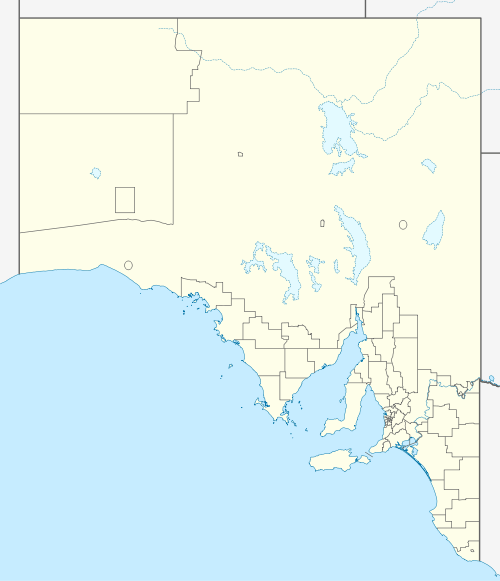Cape St Albans
| Cape St Albans South Australia | |
|---|---|
 | |
 Cape St Albans | |
| Coordinates | 35°48′8″S 138°7′31″E / 35.80222°S 138.12528°ECoordinates: 35°48′8″S 138°7′31″E / 35.80222°S 138.12528°E |
| Location | 18 km (11 mi) south east of Penneshaw [1] |
Cape St Albans (also called Cape St Alban in some sources) is a headland in the Australian state of South Australia located on the north coast of the Dudley Peninsula on Kangaroo Island in the gazetted locality of Willoughby about 18 kilometres (11 miles) south-east of the town of Penneshaw.[2][1]
The cape is described as lying ‘about 2.25 nautical miles (4.17 km) N(orth) of Cape Willoughby and extends in a N(ortherly) direction as a narrow neck of land.’ The cape serves both as the east headland of Antechamber Bay and as the west headland of Moncrieff Bay. It was named after the town of St Albans in Hertfordshire by Thomas Lipson on 21 March 1850. The cape is the site of a navigation aid which was initially a temporary fixed light installed during early 1908 and which was subsequently replaced by a lighthouse that was first lit in November 1908.[3][4][1][5][6][7]
As of late 2012, the waters adjoining its shoreline are within the protected area known as the Encounter Marine Park.[8]
References
- 1 2 3 South Australia. Department of Marine and Harbors (1985), The Waters of South Australia a series of charts, sailing notes and coastal photographs, Dept. of Marine and Harbors, South Australia, pp. Chart 11, ISBN 978-0-7243-7603-2
- ↑ "Search results for Cape St Albans with the following datasets selected - 'Suburbs and localities' and 'Gazetter'". Location SA Map Viewer. The Government of South Australia. Retrieved 18 December 2017.
- ↑ "Cape St Alban's Lighthouse". The Register. 20 November 1908. p. 4. Retrieved 19 December 2014.
- ↑ "Backstairs Passage Light". The Register. 20 February 1908. p. 4. Retrieved 19 December 2014.
- ↑ "Cape St Albans". Gazetteer of Australia online. Geoscience Australia, Australian Government.
- ↑ National Geospatial-Intelligence Agency (2010). Pub175, Sailing directions (enroute) north, west, and south coast of Australia (PDF) (10th ed.). National Geospatial-Intelligence Agency (NGA). pp. 202–203. Retrieved 16 May 2014.
- ↑ "K.I. Names". Chronicle. 4 January 1951. p. 23. Retrieved 19 December 2014.
- ↑ "Encounter Marine Park Management plan summary" (PDF). Department of Environment, Water and Natural Resources. p. 38 of 39. Retrieved 17 June 2014.